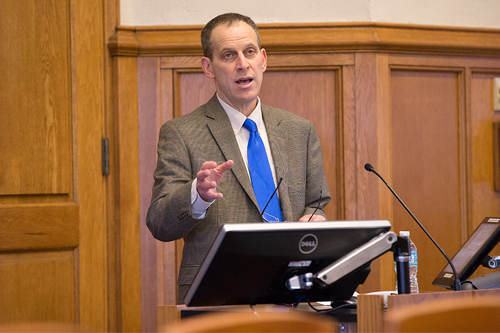Discussing the book were panelists Michael Dorf, the Robert S. Stevens Professor of Law at Cornell; Vincent Blasi, the Corliss Lamont Professor of Civil Liberties at Columbia Law School; and Shiffrin’s daughter Seana Shiffrin, a professor of philosophy and the Pete Kameron Professor of Law and Social Justice at the University of California, Los Angeles, School of Law. The panel was moderated by Professor Aziz Rana.
Speaking first, Dorf provided a summary of the book’s main points. Shiffrin, he said, accuses the U.S. Supreme Court of “free speech idolatry,” arguing that the Court habitually over protects freedom of speech in circumstances where it conflicts with other important values. These values include privacy, security against cruelty and violence, equality, and democracy. Shiffrin criticizes the “frozen categories” approach of the Roberts Court, which refuses to expand the existing categories of unprotected speech.

Prof. Michael Dorf weighs in.
Dorf noted that Shiffrin also examines ways in which the Court under protects freedom of speech, particularly as that freedom is used by the disenfranchised. “Steve thinks, at its core, what the First Amendment is about is protecting the right of dissenters and minorities to criticize the powerful,” said Dorf. “That’s why we need a First Amendment. We don’t need a First Amendment to protect powerful, moneyed interests.”
Blasi examined the book’s arguments through the lens of Chaplinsky v. New Hampshire, a 1942 Supreme Court case involving a Jehovah’s Witness who was assaulted by fellow citizens, taken into protective custody by a local official, and then charged with disturbing the peace after he loudly accused that official and his cohort of being fascists. The Court ruled against Chaplinsky, stating that the limited value of lewd, libelous, and insulting speech was “outweighed by the social interest in order and morality.”
Blasi characterized this decision as an “absolutely important precedent and dictum in terms of the good fight against First Amendment absolutism” and in that way is harmonious with Shiffrin’s arguments in his book. “Steve is very courageous in challenging conventional wisdom in arguing, for example, that regulating one person’s speech in order to prevent the drowning out of another person’s speech is a legitimate regulatory interest,” he said.
Seana Shiffrin focused her comments on the theoretical “scaffolding” of the book, challenging her father on his complaint that the Court overly privileges free speech. “I worry,” she said, “that conceiving of our reform mission as one of recalibrating the balance between free speech and other values may be hazardous, not in Steve’s hands but in the hands of those who might absorb that larger framing but pursue it with lesser nuance and finesse.”
She concluded, “Perhaps we are at an impasse. [Steve’s] book amply demonstrates how simplistic deontological thinking, when wielded by the ham-handed, can go terribly astray; I worry the same can happen with a balancing approach. Perhaps we can agree that these hazards are reasons to resist efforts to trim the law school curriculum to two years and to continue to defend the importance of theoretical alongside practical training.”
The presentation concluded with comments from Shiffrin, who explained his motivations with some strong criticism for the Roberts Court’s approach to the First Amendment. “Gruesomely violent video games sold to children being protected speech, depictions of animal cruelty, tobacco advertising when four hundred thousand people die every year because of smoking cigarettes, intentional infliction of emotional distress at funerals, the domination of election campaigns by the wealthy… when I thought about all that, I thought, I’m gonna write a book.”
